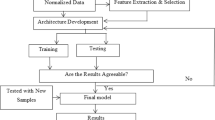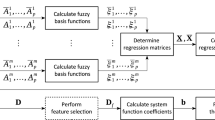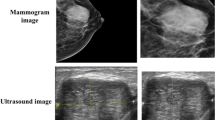Abstract
Although adaptive neuro-fuzzy inference system (ANFIS) has very fast convergence time, it is not suitable for classification problems because its outputs are not integer. In order to overcome this problem, this paper provides four adaptive neuro-fuzzy classifiers; adaptive neuro-fuzzy classifier with linguistic hedges (ANFCLH), linguistic hedges neuro-fuzzy classifier with selected features (LHNFCSF), conjugate gradient neuro-fuzzy classifier (SCGNFC) and speeding up scaled conjugate gradient neuro-fuzzy classifier (SSCGNFC). These classifiers are used to achieve very fast, simple and efficient breast cancer diagnosis. Both SCGNFC and SSCGNFC systems are optimized by scaled conjugate gradient algorithms. In these two systems, k-means algorithm is used to initialize the fuzzy rules. Also, Gaussian membership function is only used for fuzzy set descriptions, because of its simple derivative expressions. The other two systems are based on linguistic hedges (LH) tuned by scaled conjugate gradient. The classifiers performances are analyzed and compared by applying them to breast cancer diagnosis. The results indicated that SCGNFC, SSCGNFC and ANFCLH achieved the same accuracy of 97.6608 % in the training phase while LHNFCSF performed better than other methods in the training phase by achieving an accuracy of 100 %. In the testing phase, the overall accuracies of LHNFCSF achieved 97.8038 %, which is superior also to other methods. Applying LHNFCSF not only reduces the dimensions of the problem, but also improves classification performance by discarding redundant, noise-corrupted or unimportant features. Also, the k-means clustering algorithm was used to determine the membership functions of each feature. LHNFCSF achieved mean RMSE values of 0.0439 in the training phase after feature selection and gives the best testing recognition rates of 98.8304 and 98.0469 during training and testing phases, respectively using two clusters for each class. The results strongly suggest that ANFCLH can aid in the diagnosis of breast cancer and can be very helpful to the physicians for their final decision on their patients.












Similar content being viewed by others
References
Abdolmaleki P, Buadu LD, Naderimansh H (2001) Feature extraction and classification of breast cancer on dynamic magnetic resonance imaging using artificial neural network. Cancer Lett 171(2):183–191
Abdolmaleki P, Buadu LD, Murayama S et al (1997) Neural network analysis of breast cancer from MRI findings. Radiat Med 15(5):283–293
Abbass HA (2002) An evolutionary artificial neural networks approach for breast cancer diagnosis. Artif Intell Med 25(3):265–281
Alturki FA, Abdennour AB (1999) Neuro-fuzzy control of a steam boiler turbine unit. In: Proceedings of the IEEE, international conference on control applications, pp 1050–1055
Arulampalam G, Bouzerdoum A (2001) Application of shunting inhibitory artificial neural networks to medical diagnosis. In: Seventh Australian and New Zealand Intelligent Information Systems Conference, Perth, Australia, pp 89–94
Azar AT (2010) Fuzzy Systems. IN-TECH, Vienna. ISBN 978-953-7619-92-3
Azar AT (2010) Adaptive neuro-fuzzy systems. In: Azar AT (ed) Fuzzy systems. IN-TECH, Austria, pp 85–110
Baguia C (2003) Breast cancer detection using rank-nearest neighbor classification rules. Pattern Recogn 36(1):367–381
Battiti R (1989) Accelerated backpropagation learning: two optimization methods. Complex Syst 3(4):331–342
Benecchi L (2009) Neuro-fuzzy system for prostate cancer diagnosis. Urology 68(2):357–361
Bezdek JC, Ehrlich R, Full W (1984) FCM: the Fuzzy C-Means Clustering Algorithm. Comput Geosci 10(2–3):191–203
Bird RE, Wallace TW, Yankaskas BC (1992) Analysis of cancers missed at screening mammography. Radiology 184(3):613–617
Bishop CM (1996) Neural networks for pattern recognition. Oxford University Press, New York
Burke HB, Goodman PH, Rosen DB et al (1997) Artificial neural networks improve the accuracy of cancer survival prediction. Cancer 79(4):857–862
Cetişli B, Barkana A (2010) Speeding up the scaled conjugate gradient algorithm and its application in neuro-fuzzy classifier training. Soft Comput 14(4):365–378
Cetişli B (2010) Development of an adaptive neuro-fuzzy classifier using linguistic hedges: part 1. Expert Syst Appl 37(8):6093–6101
Cetişli B (2010) The effect of linguistic hedges on feature selection: part 2. Expert Syst Appl 37(8):6102–6108
Chen Y, Abraham A, Yang B (2005) Hybrid neurocomputing for breast cancer detection. The Fourth IEEE International Workshop on Soft Computing as Transdisciplinary Science and Technology (WSTST’5), pp 884–892
Cheng HD, Cai X, Chen X, Hu L, Lou X (2003) Computer-aided detection and classification of microcalcifications in mammograms: a survey. Pattern Recogn 36(12):2967–2991
Chiu SL (1994) Fuzzy model identification based on cluster estimation. J Intell Fuzzy Syst 2(3):267–278
Chou SM, Lee TS, Shao YE, Chen IF (2004) Mining the breast cancer pattern using artificial neural networks and multivariate adaptive regression splines. Expert Syst Appl 27(1):133–142
Diamantidis NA, Karlis D, Giakoumakis EA (2000) Unsupervised stratification of cross-validation for accuracy estimation. Artif Intell 116(1–2):1–16
Floyd CE, Lo JY, Yun AJ et al (1994) Prediction of breast cancer malignancy using an artificial neural network. Cancer 74(11):2944–2948
Fletcher R (2000) Practical methods of optimization, 2nd edn. Wiley, New York
Fletcher R, Reeves CM (1964) Function minimization by conjugate gradients. Comput J 7(2):149–154
Fogel DB, Wasson EC, Boughton EM, Porto VW (1998) Evolving artificial neural networks for screening features from mammograms. Artif Intell Med 14(3):317–326
Francois D, Rossi F, Wertz V, Verleysen M (2007) Resampling methods for parameter-free and robust feature selection with mutual information. Neurocomputing 70(7–9):1276–1288
Furundzic D, Djordjevic M, Bekic AJ (1998) Neural networks approach to early breast cancer detection. J Syst Archit 44(8):617–633
Gill PE, Murray W, Wright MH (1980) Practical optimization. Academic Press Inc., New York
Hamdan H, Garibaldi JM (2010) Adaptive Neuro-Fuzzy Inference System (ANFIS) in Modelling Breast Cancer Survival. WCCI 2010 IEEE World Congress on Computational Intelligence, July, 18-23, CCIB, Barcelona, Spain, pp 1–8
Hartigan JA, Wong MA (1979) A k-means clustering algorithm. Appl Stat 28(1):100–108
Hestenes M (1980) Conjugate direction methods in optimization. Springer-Verlag, New York
Hosseini R, Ellis T, Mazinani M, Dehmeshki J (2011) A genetic fuzzy approach for rule extraction for rule-based classification with application to medical diagnosis. In: European Conference on Machine Learning and Principles and Practice of Knowledge Discovery in Databases (ECML PKDD); 05–09 Sep 2011, Athens, Greece
Hung WL, Yang MS, Yu J, Hwang CM. (2010) Feature-Weighted Mountain Method with Its Application to Color Image Segmentation. RSKT’10, LNAI 6401, pp 537–544. Springer-Verlag Berlin Heidelberg
Hu Y, Zhang SZ, Yu JK, Liu J, Zheng S, Hu X (2005) Diagnostic application of serum protein pattern and artificial neural network software in breast cancer. Ai Zheng 24(1):67–71
Hu Q, Yu D, Xie Z (2006) Information-preserving hybrid data reduction based on fuzzy-rough techniques. Pattern Recogn Lett 27(5):414–423
Ioanna C, Evalgelos D, George K (2000) Fast detection of masses in computer aided mammography. IEEE Signal Process Mag 17(1):54–64
Islam MJ, Ahmadi M, Sid-Ahmed MA (2010) An efficient automatic mass classification method in digitized mammograms using artificial neural network. Int J Artif Intell Appl (IJAIA) 1(3):1–13
Jain R, Abraham A (2004) A comparative study of fuzzy classification methods on breast cancer data. Australas Phys Eng Sci Med 27(4):213–218
Jang JSR (1992) Neuro-fuzzy modeling: architectures, analyses, and applications. Ph.D. Dissertation, EECS Department, University of California at Berkeley
Jang JSR (1993) ANFIS: adaptive-network-based fuzzy inference system. IEEE Trans Syst Man Cybern 23(3):665–685
Jang JSR, Sun CT (1995) Neuro-fuzzy modeling and control. Proc IEEE 83(3):378–406
Jang JSR, Sun CT, Mizutani E (1997) Neuro-fuzzy and soft computing. Prentice-Hall, Englewood Cliffs
Janghel, R.R., Shukla, A., Tiwari, R., Kala, R. (2010). Breast cancer diagnosis using Artificial Neural Network models. In: Proceedings of the 3rd IEEE International Conference on Information Sciences and Interaction Sciences, Chengdu, China, June 23–25, pp 89–94
Jerez-Aragonés JM, Gomez-Ruiz JA, Ramos-Jiménez G et al (2003) A combined neural network and decision trees model for prognosis of breast cancer relapse. Artif Intell Med 27(1):45–63
Johansson EM, Dowla EU, Goodman DM (1991) Backpropagation learning for multi-layer feed-forward neural networks using the conjugate gradient method. Int J Neural Syst 2(4):291–302
Kala R, Janghel RR, Tiwari R, Shukla A (2011) Diagnosis of breast cancer by modular evolutionary neural networks. Int J Biomed Eng Technol (IJBET) 7(2):194–211
Kiyan T, Yildirim T (2004) Breast cancer diagnosis using statistical neural networks. J Elect Electron Eng 4(2):1149–1153
Kuzmiak CM, Dancel R, Pisano E et al (2006) Consensus review: a method of assessment of calcifications that appropriately undergo a six-month follow-up. Acad Radiol 13(5):621–629
Lee K, Street WN (2003) A time- and memory-efficient algorithm for automated segmentation of breast cancer nuclei. J Korea Inform Sci Soc 30(9–10):973–982 (in Korean)
Lee HM, Chen CM, Chen JM, Jou YL (2001) An efficient fuzzy classifier with feature selection based on fuzzy entropy. IEEE Trans Syst Man Cybern Part B 31(3):426–432
Li H, Chen CLP, Huang HP (2001) Fuzzy fuzzy neural intelligent system: mathematical foundation and the applications in engineering. CRC Press LLC, New York
Liu Y, Zheng YF (2006) FS_SFS: a novel feature selection method for support vector machines. Pattern Recogn 39(7):1333–1345
Lundin M, Lundin J, Burke HB et al (1999) Artificial neural networks applied to survival prediction in breast cancer. Oncology 57(4):281–286
Malek J, Sebri A, Mabrouk S et al (2009) Automated breast cancer diagnosis based on GVF-snake segmentation, wavelet features extraction and fuzzy classification. Signal Process Syst 55(1–3):49–66
Mamdani EH, Assilian S (1975) An experiment in linguistic synthesis with a fuzzy logic controller. Int J Man-Mach Stud 7(1):1–13
Mangasarian OL, Setiono R, Wolberg WH (1990) Pattern recognition via linear programming: theory and application to medical diagnosis. In: Proceedings of the Workshop on Large-Scale Numerical Optimization: 22–31, Philadelphia, PA, SIAM
Marchevsky AM, Shah S, Patel S (1999) Reasoning with uncertainty in pathology: artificial neural networks and logistic regression as tools for prediction of lymph node status in breast cancer patients. Mod Pathol 12(5):505–513
Mariani L, Coradini D, Biganzoli E et al (1997) Prognostic factors for metachronous contralateral breast cancer: a comparison of the linear Cox regression model and its artificial neural network extension. Breast Cancer Res Treat 44(2):167–178
Mattfeldt T, Kestler HA, Sinn HP (2004) Prediction of the axillary lymph node status in mammary cancer on the basis of clinicopathological data and flow cytometry. Med Biol Eng Comput 42(6):733–739
Mazurowski MA, Habas PA, Zurada JM et al (2008) Training neural network classifiers for medical decision making: the effects of imbalanced datasets on classification performance. Neural Netw 21(2–3):427–436
Mian S, Ball G, Hornbuckle J et al (2003) A prototype methodology combining surface-enhanced laser desorption/ionization protein chip technology and artificial neural network algorithms to predict the chemoresponsiveness of breast cancer cell lines exposed to Paclitaxel and Doxorubicin under in vitro conditions. Proteomics 3(9):1725–1737
Mitra S, Hayashi Y (2000) Neuro-fuzzy rule generation: survey in soft computing framework. IEEE Trans Neural Netw 11(3):748–757
Moayedi F, Boostani R, Kazemi AR, Katebi S, Dashti E (2010) Subclass fuzzy-SVM classifier as an efficient method to enhance the mass detection in mammograms. Iran J Fuzzy Syst 7(1):15–31
Moller MF (1993) A scaled conjugate gradient algorithm for fast supervised learning. Neural Netw 6:525–533
Mousa R, Munib Q, Moussa A (2005) Breast cancer diagnosis system based on wavelet analysis and fuzzy-neural. Expert Syst Appl 28(4):713–723
Naguib RN, Sakim HA, Lakshmi MS et al (1999) DNA ploidy and cell cycle distribution of breast cancer aspirate cells measured by image cytometry and analyzed by artificial neural networks for their prognostic significance. IEEE Trans Inf Technol Biomed 3(1):61–69
Naguib RN, Adams AE, Horne CH et al (1997) Prediction of nodal metastasis and prognosis in breast cancer: a neural model. Anticancer Res 17(4A):2735–2741
Nauck D, Kruse R (1999) Neuro-fuzzy systems for function approximation. Fuzzy Sets Syst 10(2):261–271
Nieto J, Torres A (2003) Midpoint for fuzzy sets and their application in medicine. Artif Intell Med 27(1):321–355
Padmavati J (2011) A comparative study on breast cancer prediction using RBF and MLP. Int J Sci Eng Res 2(1):1–5
Pena-Reyes CA, Sipper M (1999) A fuzzy-genetic approach to breast cancer diagnosis. Artif Intell Med 17(2):131–155
Powell M (1977) Restart procedures for the conjugate gradient method. Math Program 12(1):241–254
Rani KU (2010) Parallel approach for diagnosis of breast cancer using neural network technique. Int J Comput Appl 10(3):1–5
Ripley RM, Harris AL, Tarassenko L (2004) Non-linear survival analysis using neural networks. Stat Med 23(5):825–842
Roberts M, Kahn E, Haddawy P (1995) Development of a Bayesian network for diagnosis of breast cancer. IJCAI-95 workshop on building probabilistic networks, Montréal, Québec, Canada
Ronco AL (1999) Use of artificial neural networks in modeling associations of discriminant factors: towards an intelligent selective breast cancer screening. Artif Intell Med 16(3):299–309
Russo M, Jain L (2001) Fuzzy learning and application. Prentice-Hall, Englewood Cliffs
Sarvestan SA, Safavi AA, Parandeh MN, Salehi M (2010) Predicting Breast Cancer Survivability using data mining techniques. In: 2nd International conference on software technology and engineering (ICSTE), 2:227–231
Salim MI, Ahmad AH, Ariffin I et al (2012) Development of breast cancer diagnosis tool using hybrid magnetoacoustic method and artificial neural network. Int J Biol Biomed Eng 6(1):61–68
Salzberg SL (1997) On comparing classifiers: pitfalls to avoid and a recommended approach. Data Min Knowl Disc 1(3):317–327
Sameti M, Ward R (1996) A fuzzy segmentation algorithm for mammogram partitioning. Third international workshop on digital mammography, Amsterdam, Netherlands, pp 471–474. ISBN: 0-444-82431-6
Sebri A, Malek J, Tourki R (2007) Automated breast cancer diagnosis based on GVF-snake segmentation, wavelet features extraction and neural network classification. J Comput Sci 3(8):600–607
Seker H, Odetayo MO, Petrovic D et al (2002) Assessment of nodal involvement and survival analysis in breast cancer patients using image cytometric data: statistical, neural network and fuzzy approaches. Anticancer Res 22(1A):433–438
Sickles EA (1986) Breast calcifications: mammographic evaluation. Radiology 160(2):289–293
Shanthi S, Bhaskaran VM (2011) Intuitionistic fuzzy C-means and decision tree approach for breast cancer detection and classification. Eur J Sci Res 66(3):345–351
Spence D, Parra L, Sajda P (2001) Detection, synthesis and compression in mammographic image analysis using a hierarchical image probability model. Artif Intell Med 25(31):365–371
Street WN (1991) Toward automated cancer diagnosis: an interactive system for cell feature extraction. Technical Report 1052, Computer Sciences Department, University of Wisconsin, Madison, WI
Street W (1998) A neural network model for prognostic prediction. In: Proceeding ICML ‘98 Proceedings of the Fifteenth International Conference on Machine Learning:540–546. ISBN: 1-55860-556-8
Street WN (2000) Xcyt: A system for remote cytological diagnosis and prognosis of breast cancer. In: Jain LC (ed) Soft computing techniques in breast cancer prognosis and diagnosis. World Scientific Publishing, Singapore, pp 297–322
Suckling J, Parker J, Dance D, Astley S, Hutt I, Boggis C et al (1994) The mammographic images analysis society digital mammogram database. Exerpta Med Int Congr Ser 1069:375–378
Sun CT, Jang JSR (1993) A neuro-fuzzy classifier and its applications. Proc. of IEEE Int. Conf. on Fuzzy Systems, San Francisco 1:94–98. Int Conf Fuzzy Syst, San Francisco 1:94–98
Sawarkar SD, Ghatol AA, Pande AP (2006) Neural Network aided Breast Cancer Detection and Diagnosis. Proceedings of the 7th WSEAS International Conference on Neural Networks, Cavtat, Croatia, June 12–14, pp 158–163
Takagi T, Sugeno M (1985) Fuzzy identification of systems and its applications to modeling and control. IEEE Trans Syst Man Cybern 15(1):116–132
Theoridis S, Koutroumbas K (2003) Pattern recognition, 2nd edn. Academic Press, London
Tourassi GD, Markey MK, Lo JY, Floyd CE (2001) A neural network approach to breast cancer diagnosis as a constraint satisfaction problem. Med Phys 28(5):804–811
Tsang ECC, Yeung DS, Wang XZ (2003) OFFSS: optimal fuzzy-valued feature subset selection. IEEE Trans Fuzzy Syst 11(2):202–213
Übeyli ED (2009) Adaptive neuro-fuzzy inference systems for automatic detection of breast cancer. J Med Syst 33(5):353–358
UCI (2012) Machine Learning Repository. http://archive.ics.uci.edu/ml/index.html. Accessed 23 Oct 2012
Verma K, Zakos J (2001) A computer-aided diagnosis system for digital mammograms based on fuzzy-neural and feature extraction techniques. IEEE Trans Inf Technol Biomed 5(1):46–54
Wang Z, Palade V (2007) A Comprehensive fuzzy-based framework for cancer microarray data gene expression analysis. In: Proceedings of the 7th IEEE International Conference on Bioinformatics and Bioengineering, 14–17 Oct. 2007, Oxford Univ., Oxford, pp 1003–1010
Wang JS, Lee GCS (2002) Self-adaptive neuron-fuzzy inference systems for classification applications. IEEE Trans Fuzzy Syst 10(6):790–802
Wolberg WH, Street WN (2002) Computer-generated nuclear features compared to axillary lymph node status and tumor size as indicators of breast cancer survival. Human Pathol 33(11):1086–1091
Wolberg WH, Mangasarian OL (1990) Multisurface method of pattern separation for medical diagnosis applied to breast cytology. Proc Natl Acad Sci USA 87:9193–9196
Zaiane O, Maria-Luiza A, Alexandru C (2001) Application of data mining techniques for medical image classification. Proceedings of second international workshop on multimedia data mining (MDM/KDD’) in conjunction with seventh ACM SIGKDDS, USA
Zaiane O, Maria-Luiza A, Alexandru C (2002) Mammography classification by an association rule-based classifier. Proceedings of second international workshop on multimedia data mining (MDM/KDD’) in conjunction with seventh ACM SIGKDD, USA
Zadeh LA (1965) Fuzzy sets. Inform Cont 8(3):338–353
Zadeh LA (1968) Fuzzy algorithm. Inf Cont 12(2):94–102
Zadeh LA (1973) Outline of a new approach to the analysis of complex system and decision processes. IEEE Trans Syst Man Cyber 3(1):28–44
Zadeh LA (1983) Commonsense knowledge representation based on fuzzy logic. IEEE Comput 16(10):61–65
Zadeh LA (1983) Fuzzy logic. IEEE Comput 1(4):83–93
Author information
Authors and Affiliations
Corresponding author
Rights and permissions
About this article
Cite this article
Azar, A.T., El-Said, S.A. Superior neuro-fuzzy classification systems. Neural Comput & Applic 23 (Suppl 1), 55–72 (2013). https://doi.org/10.1007/s00521-012-1231-8
Received:
Accepted:
Published:
Issue Date:
DOI: https://doi.org/10.1007/s00521-012-1231-8




